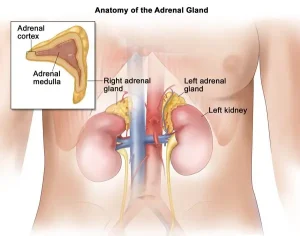Overview
Diagnosis of ALD
Doctors diagnose ALD by evaluating symptoms, medical history, family history, and lab tests.
Blood Testing
Blood tests are essential for diagnosing ALD:
-
Very long-chain fatty acids (VLCFAs): High levels in the blood indicate ALD
-
Genetic testing: Identifies mutations causing ALD
-
Adrenal gland function: Blood tests can assess how well the adrenal glands are working
MRI
Magnetic Resonance Imaging (MRI) uses magnets and radio waves to create detailed images of the brain. MRI can detect:
-
White matter damage in the brain
-
Early signs of leukodystrophy using specialized MRI techniques
Vision Screening
Vision tests monitor disease progression in males who may not show other symptoms.
Skin Biopsy and Fibroblast Cell Culture
Skin samples may be taken in some cases to measure VLCFA levels and support diagnosis.
Treatment of ALD
Currently, ALD has no cure, but treatments focus on slowing disease progression, managing symptoms, and supporting quality of life.
Stem Cell Transplant
Stem cell transplantation may help slow or halt ALD progression in children if performed early, before neurological symptoms appear. Stem cells are usually obtained through bone marrow transplant.
Adrenal Insufficiency Treatment
Many individuals with ALD develop adrenal insufficiency, which can be managed with:
-
Regular adrenal gland testing
-
Corticosteroid replacement therapy to restore hormone balance
Medications
Medications may be prescribed to relieve symptoms such as:
-
Muscle stiffness
-
Seizures
Physical Therapy
Physical therapy can help:
-
Reduce muscle spasms and rigidity
-
Improve mobility using wheelchairs or other assistive devices if needed
Gene Therapy
Recent clinical trials show that gene therapy may be an alternative to stem cell transplantation in boys with early-stage cerebral ALD.
-
Results: Disease progression stabilized in 88% of trial participants
-
Note: Additional research is needed to confirm long-term safety and effectiveness
When to Seek Care
Seek medical attention if you notice:
-
Neurological changes such as coordination problems or behavioral changes
-
Signs of adrenal insufficiency, including fatigue, weight loss, or low blood pressure
-
Progressing muscle weakness or spasticity
Advertisement

